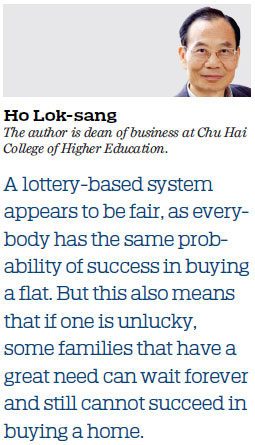Time to consider points system for HOS homes
Updated: 2019-01-29 07:25
By Ho Lok-sang(HK Edition)
|
|||||||
Ho Lok-sang explains why a points-based mechanism for determining who are eligible to buy Home Ownership Scheme flats is a fair, practical and workable solution
Under the Green Form Subsidized Home Ownership Scheme (GFHOS), 2,545 flats in Cheung Sha Wan were put on sale at deeper discount against the market price than regular HOS flats. The flats were only available for existing tenants in public rental housing flats. However, those who had been assigned a PRH flat through the express flat assignment mechanism had to wait three years before becoming eligible for the GFHOS. When applications were closed, the oversubscription rate was in excess of eight times.
The Urban Renewal Authority launched its first "Starter Homes" Pilot Project with its 450-apartment eResidence. When applications were closed on Jan 23, the oversubscription ratio was over 45 times. The units were priced at 38 percent below market rates.
With the selling price below the "market-clearing rate", these oversubscribed flats are generally sold through a lottery mechanism. For example, for the GFHOS development, the lottery results will be announced in February. Buyers will have the chance to pick their preferred flats in March.
This lottery-based method of selecting buyers among applicants has been adopted by the Housing Authority for a long time. A lottery-based system appears to be fair, as everybody has the same probability of success in buying a flat.

But this also means that if one is unlucky, some families that have a great need can wait forever and still cannot succeed in buying a home. Because the chances of success are so slim, many have been forced to stop waiting and rush to buy in the private market, lest price increases outpace salary increases, and the private homes become even more unaffordable.
Paradoxically, the policy decision to deepen the discount for HOS flats is making homeownership an even more distant dream, because the deep discount is attracting more applications, and the chances of success at the lottery have diminished.
Actually I do support linking HOS flat prices to the median household incomes rather than to the market price. I have long advocated this in order to reduce panic purchases from aspiring homebuyers who fear home prices would outpace incomes. But my proposal was for some kind of government assurance of availability of a flat to all qualified buyers. I would have the government take down the information for all aspiring qualified buyers who "pre-order" the flats and then seek to build HOS flats for them. I would even dispense with the income limit, and simply impose the condition that buyers must be a married or to-be-married couple who must not own any property at the time of purchase or any other property at any time after the purchase. The flat will be strictly for serving as a home for the buyers. Resales are allowed without any time restriction, but buyers in the resale must also be qualified Hong Kong residents.
The conditions of purchase and resale will make the proposed kind of HOS housing strictly "homes" in nature and not an investment tool. Those who aspire to get rich from property purchases would abhor these homes, because they disallow property ownership beyond these homes. Moreover, those who have become financially better-off would have a strong incentive to sell the flats, and thus reducing the burden on the government in supplying more flats.
While I think the proposed scheme is eminently workable, some may think this is a long shot. If the Housing Authority takes this view, it should consider dumping its "sale by lottery" in favor of "sale by deservingness".
Under the "sale by deservingness" approach, aspiring buyers will be rated according to their needs and the months of having been on the waiting list. The longer a household has waited, the higher will be the deservingness score.
Another key rating about deservingness is the current housing conditions of the household and the number of members of the household. Those in very poor housing conditions should of course have higher priority over those who do not. Those with lower disposable incomes after rent should also have higher priority. Thus for two households with exactly the same rating on housing conditions and identical household incomes, the household paying higher rent will have a higher priority over the other. For two households with the same incomes and similar household characteristics, suppose one chooses to pay more for somewhat better housing conditions, the deservingness ratings are probably not changed, because the better housed family has less disposable incomes after paying the rent.
I believe the deeper the discount in the prices of HOS or other subsidized flats, the greater the need for a points-based mechanism in determining who will buy the flats. Otherwise, by increasing the jackpot, the chances of winning fall, and the hardest hit will be those with the greatest housing needs. I also believe it is pointless to extend the time needed before a purchased HOS flat is resold in the open market. The larger size of the jackpot means profit seekers will still be lured to play the game of lottery.
(HK Edition 01/29/2019 page7)